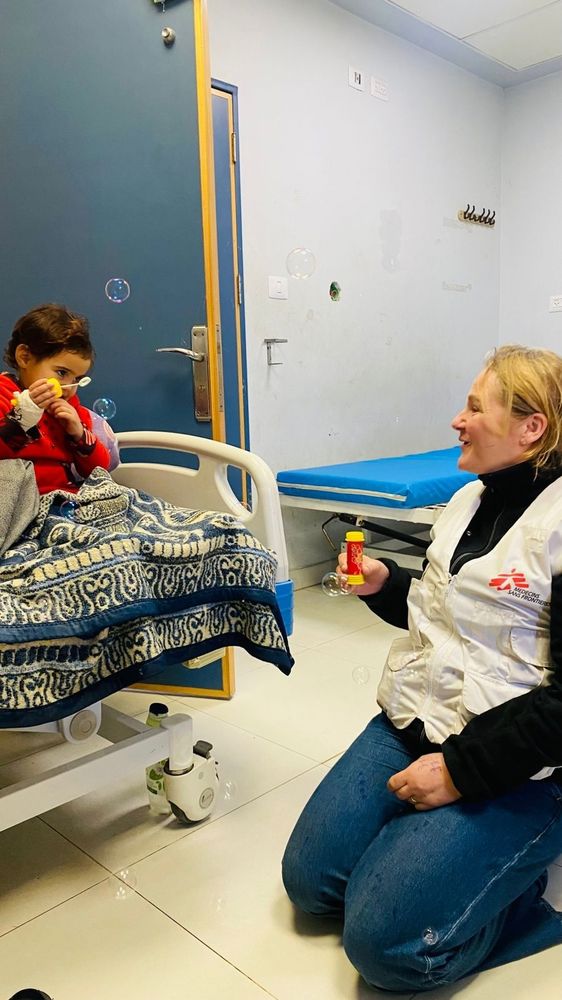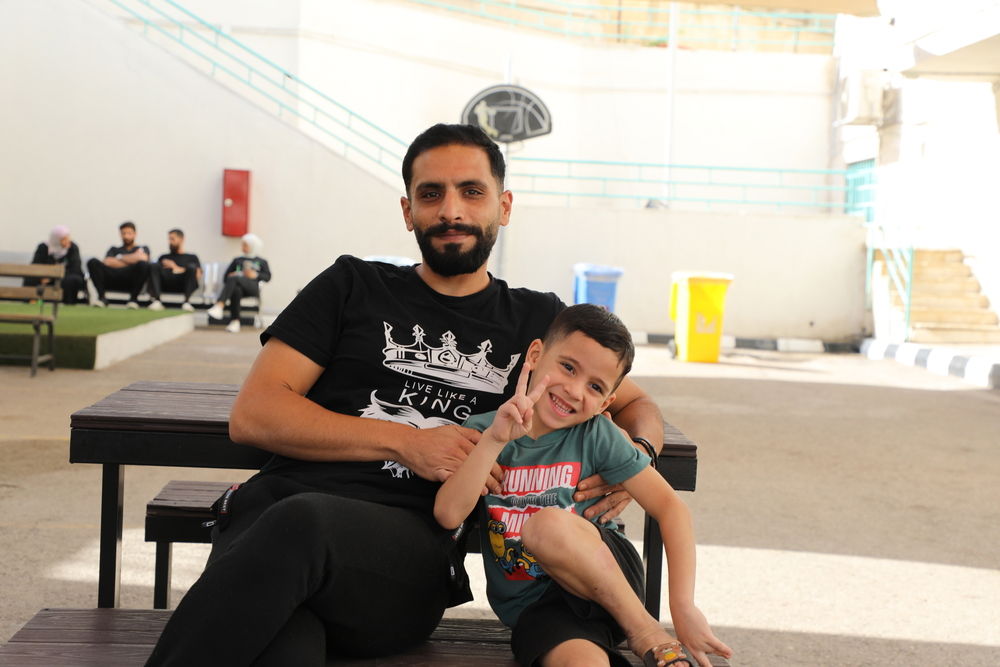I hear a piercing scream. I drop everything and run. What I hear is the panicked cry of a child; it is a cry that pierces my entire body.
Every day, I witness such acute emotional distress many times over here in the orthopedic and burn unit at Nasser Hospital. Last August, I spent five weeks working at the clinic in Khan Yunis in the southern Gaza Strip for the first time. Many of our patients are children who have been seriously wounded in the war. They have burns, broken bones, infected wounds; some have had to have limbs amputated. Most of them have lost several family members in bomb attacks. They are all severely traumatised.
This is also true of the twelve-year-old boy who is still screaming and completely distraught when I enter the treatment room. He suffered extensive burns in an explosion. Today, he has come to our hospital for outpatient wound care, which is only possible under local anesthesia. A nurse tries to inject the anesthetic into his arm. But this is extremely stressful for the boy. He feels a threatening loss of control. The panic is so great that he can no longer distinguish the danger posed by the needle from the danger posed by the bomb that recently destroyed his home and almost killed his entire family. Only he and his father survived.
I ask the nurse to stop the treatment immediately and ask the father to come close to his son, stroke him, and talk to him. I also speak reassuringly to the boy. It takes some time, but the boy slowly calms down. We agree that the nurse will give him a sedative before giving him the injection and that his father will stay with him the whole time.
There is not much I can do for the boy here in the Gaza Strip. But I can prevent the treatment from traumatising him again, which would have serious psychological consequences. A few weeks later, the father visits me again at the clinic — just to thank me. He says that what I did for his son came to him from God. His words make me feel humbled. But they express how valuable my small act of help was for the father and his son: in the war, they have largely lost their faith in the goodness of the world. Experiencing a gesture of humanity amid all the horror has given them a tiny bit of hope.
For me, the hardest part of my work in the Gaza Strip is that my options for helping are limited. I cannot offer the children trauma and grief therapy; I cannot even tell them that they are safe now. But there is one thing I can do with my team of psychologists, social workers, and counselors: we can provide the children with psychological first aid to help them cope in the here and now.
Traumatised people need stability, security, predictability, a safe space, and reliable social structures. The people in the Gaza Strip have none of these things. They have been deprived of what we all need to live mentally healthy lives. This poses immense dangers, especially for children. If they are exposed to extreme tension and fear for a long period of time, this condition threatens to become chronic – with negative effects on the development of their brains: The amygdala, the area of the brain responsible for strong emotional impressions, continues to grow; at the same time, the hippocampus, the part of the brain that is important for rational thinking and learning, does not develop as it should.
The aim of our psychological first aid in war zones is therefore to give children breaks where they are free from fear and can breathe deeply. Every single one of these moments counts in preventing the fear from becoming chronic. This certainty keeps me returning to Nasser Hospital in January and February. Shortly after my arrival, there is a temporary ceasefire. I am glad to see that the stress is easing a little for the children and the panic attacks are decreasing. However, many are now showing symptoms of generalised anxiety disorder. They are constantly nervous and anxious, and even everyday things frighten them.
When I first meet little Maria, she is so afraid of me and my white MSF vest that she starts to scream. Everything in our hospital is dangerous to her because she associates the clinic with the pain in her body and the bomb attack that seriously wounded her.
Several times a day, I open the door to her room, look in, and say “Hello” in a friendly voice. After a few days, Maria remains calm when she sees me for the first time. Only now do I approach her bed, step by step, at the pace she allows. Finally, I am able to sit down next to her and her mother. I take a bottle of bubble mixture out of my bag, which is a truly magical tool for me. Maria reacts fearfully at first. But then she plucks up the courage and reaches for the container. When she blows, it deepens her breathing and draws her attention to something beautiful and carefree. Maria's nervous system relaxes; for a moment, she can feel joy and let go of her fear. At that moment, the girl smiles—the first time in four months, her mother tells me. It is a moment that fills my heart.
In the weeks that follow, Maria and I become increasingly close. During our time together, her mother sees what is good for her daughter and helps her overcome her fear. She becomes increasingly confident in dealing with her daughter's trauma. This also allows the mother to relax more and be there for Maria. Providing basic psychological knowledge to relatives is also the aim of the group sessions that I offer with my team at Nasser Hospital every week. We explain, for example, that it is a typical reaction to traumatic experiences for children to wet themselves, pull out their hair, or stop speaking.
When the Israeli government breaks the ceasefire in March and starts bombing the Gaza Strip again, I am already back home in Norway. I am in contact with my Palestinian colleagues many times a day. I admire them greatly for coming to the clinic day after day, caring for our patients with great devotion, never knowing whether they will see their own children alive again. The ceasefire had finally given them hope again, despite all the loss and destruction. But now the fear is back. Once again, they are being told to evacuate. Some write to me saying they are at the end of their tether and too exhausted to flee again.
I myself have only one wish: to be there and support my colleagues and the children in the Gaza Strip. That is why I will return to Khan Yunis with MSF in August. If our hospital is still there by then.
Shortly after our conversation with Katrin Glatz Brubakk, Nasser Hospital was hit by a rocket attack on March 23. The surgical ward was severely damaged and two people died. MSF is still working at the Nasser Hospital and is currently providing assistance at eleven other health facilities in the Gaza Strip.
German-Norwegian Katrin Glatz Brubakk has been working with victims of war and torture for ten years, including eight assignments with MSF.



